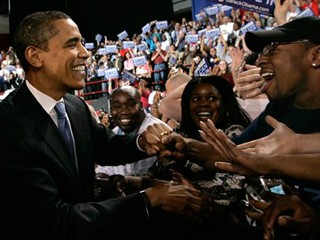
Obama tackles the collective superego of the African-American community, the victim of “internalized limits.”
On July 18th, on the occasion of the centennial of the NAACP (National Association for the Advancement of Colored People), President Obama declared in an address to the African-American community: “We need a new mind set, a new set of attitudes – because one of the most durable and destructive legacies of discrimination is the way we’ve internalized a sense of limitation; how so many in our community have come to expect so little from the world and from themselves.”
Obama called for a shift in mentality on the part of the African-American community. In doing so, he pitted himself against what psychoanalysis call the “collective superego” of that community.
He spoke with much intelligence and audacity on the internalized limitations of discrimination – that is to say, a conditioning of the mind that begins in early childhood and that, unconsciously, affects our view of the world and our position in it.
Becoming a leader while one’s parents, one’s family, and one’s community have suffered from merciless exploitation by those in power could feel like a betrayal of one’s origins, to the point that doing so could be impossible or unbearable.
At the same time, the desire for social promotion could subconsciously feel like a betrayal of a community that has built itself under terribly demeaning social conditions (like slavery and racial discrimination) and which has formed, transmitted, and perpetuated limits that have become unconscious obstacles to such promotion.
What will help us get past those limits, what will permit the “new mind set” that Obama speaks of?
He gives us a part of the answer. His own life, he explained, could have taken a completely different shape if his mother hadn’t spurred him on. “That mother of mine, she gave me love; she pushed me, she cared about my education; she took no lip; she taught me right from wrong. Because of her, I had a chance to make the most of my abilities. I had the chance to make the most of my opportunities. I had the chance to make the most of life.”
It’s not just the collective superego that is internalized; the parental superego (in this case, the maternal superego) is as well. One senses in the words of President Obama that his mother interjected some extra push, some extra stimulus, so that his ego is in harmony with his maternal superego. It imposes no (or few) limits on his aspirations, but rather orients him towards an ideal self. The conscious will often stays weak if it doesn’t have the support of a life drive, of which the superego offers the means to fulfill by orienting it culturally and morally.
Yet, Obama’s liberated ego is in conflict with the collective superego that restricts the egos of a part of the African-American community: “One of the most durable and destructive legacies of discrimination is the way we’ve internalized a sense of limitation.”
This “we” is remarkable. Obama takes upon himself the limits of this community while he himself has surpassed them. He does this in order to take part in the collective struggle against the stifling superego, to unite himself with those who haven’t transcended it, to unburden them from their unconscious guilt by taking responsibility himself for the betrayal of the past.
And what does he propose in order to surpass these limits? Education, certainly, but not just in any manner; he speaks of education created by love, and there, immediately, he speaks of his mother.
She gave of herself through love. The ideal of right and wrong that she taught him, the will that she nurtured by providing him this emotional care. He says it himself: “She cared about my education.” “She gave me love.” She didn’t do it for duty or as a burden or as an intellectual or political exercise. No, she did it with love and with firmness.
In this gorgeous confession, he gives the gift of his mother to the African-American community.
By its entry into the collective unconscious, the spirit of his mother participates from now on in the battle against powerlessness endured by mothers, but also by fathers who don’t believe they can help their children surpass the limits that this collective superego, this community conditioning, imposes on them.
Only a man who carries within him the struggle against failure and who, like Moses, has seen the suffering of his people, could have thus taken it upon himself to transcend his internalized limits and to confront the subconscious pharaoh that keeps his people in submission – to transform them into internally free men, a necessary condition for externally enjoying liberty.

Leave a Reply
You must be logged in to post a comment.